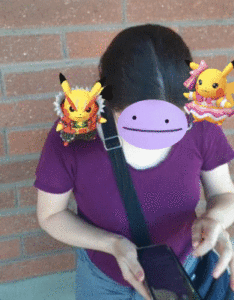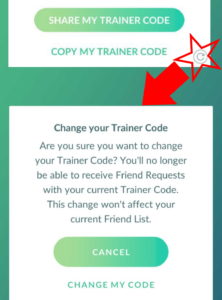
Gamers have been discussing the real-world issues that arise in augmented reality games, especially Pokemon Go, for years. In fact, Raph Koster himself addressed not only how ARG issues were inevitable but something that had already taken place in multiple PvP MMORPGs soon after the game’s launch. To date, POGO is the only game we’ve had to make a dedicated death tag for, along with other crime-oriented tags, simply because the game can bring the worst out in people.
That particular situation has improved in terms of recorded violence and injury counts, thanks to a combination of COVID, remote raiding, and the reworking of raid rewards to be a bit more group-based rather than team-based: Pokemon GO is currently death/injury-free since May 2020. However, that doesn’t mean everything is fine. PvP is natural in most games, but it can get very personal when the player is also the avatar. Unlike in traditional MMOs, you (usually) can’t name/server change to escape harassment in ARGs. And while being with other people IRL certainly makes MMOARGs feel much more social than traditional MMOs, they also come with more risks for harassment and stalking that can’t be avoided just by logging out.
 The nature of harassment
The nature of harassment
ARG harassment can come in many different flavors. One of the more common ones would be real-life players getting a bit too “friendly” with another player, especially with a female player. Maybe it’s just a crush, but unwanted advances are just that: unwanted. When the game’s company refuses to provide meaningful in-game communication for its massive, multiplayer playerbase, players sometimes must resort to giving other local players contact information, leading to unwanted calls and texts. When a player refuses to back down on unwanted approaches, it can mean asking the community to step in and actively work with the people involved. It may take some time, but it can work. However, as I’ve learned from first-hand experience, the group and its leaders may also try to avoid responsibility.
This is where group harassment can come in. As I’ve mentioned before, playing a game with a real-life community can really help form meaningful bonds, but it also means it’s harder to escape harassment. If you go to the same school, office, gym, or even just supermarket as fellow gamers you’ve fallen out with, it can make life difficult, even if other said gamers only saw the abuse and refused or failed to intervene. I think many of us play games partially because we can separate video game drama from real-life drama. But when that line gets blurred, it’s hard to escape without actually moving towns/cities outright. However, at the very least, you can talk to your accusers and make your feelings known, maybe even bring in another community to assist with this – for example, if harassment continues at work or school.
 The final kind of harassment I’ll mention is the anonymous type. Especially with PvP targets that show player names, it’s easy to learn who’s a local player and who’s not. You get an idea of where players are active and can potentially meet them. I’ve had rivals turn into friendly faces, but also the reverse. Most of it is easy enough to deal with, especially if you can just talk things out.
The final kind of harassment I’ll mention is the anonymous type. Especially with PvP targets that show player names, it’s easy to learn who’s a local player and who’s not. You get an idea of where players are active and can potentially meet them. I’ve had rivals turn into friendly faces, but also the reverse. Most of it is easy enough to deal with, especially if you can just talk things out.
However, if someone refuses to talk, or they aren’t actually a local but a spoofer, things can get weird.
Imagine having a virtual fort that someone keeps taking from you. Pretty normal for PvPers, but still not cool. Now imagine that said person is able to hide their faction/team/username. Now imagine that this is constantly happening to bases you capture right behind you in real life. Imagine that one of the bases is your home. Imagine that player constantly assaulting your home base – your physical home location – any time you interact with it, demonstrating that they’re watching and following you, personally.
It can be quite unnerving, especially if the assailant makes it clear that you’re the target. Maybe they’ve named their handle after you, or maybe they make it a point to go after targets with your name on them or avatar inside. Imagine driving across town, trying to play, and finding that person following you to continue the harassment.
Players might follow their targets in other online games, but you can log out from that. You know who your virtual stalker is, and often they have something in-game to gain. ARGs are far more personal because you’re not just following a game avatar; you’re following a real human being.
For the stalked person, it’s one thing if you know who the player really is, but if it’s someone with an account you’re not familiar with, or the stalker does it in a way that masks their real and/or virtual identity as well (such as with spoofing), you’re then unable to deal with the issue yourself. Again, in an MMO, you could just call in your guild, but IRL, you now have to look at who’s near you, try to recognize cars and see if you’re being followed, stay in open areas so you can spot your stalker but also be seen if they want to approach you… it’s not the same as “just playing the game” as I’ve seen some people call it.
You’ll want to try to report this player behavior, but some game companies aren’t well-known for adequately protecting their players. Again, I have experience with this. Obviously, if a brick comes through your window with a note saying, “RealRickSanchez, if you ever capture another Portal, I’ll cut you!” you should probably stop playing the game and maybe bring in some RL professionals. However, the act of harassment alone can make a game feel more physically stressful, especially knowing that your real body is the one being watched.
Options beyond dev intervention
You can’t rely on devs to protect you. It’s not right, and you shouldn’t completely stop reporting players as companies do track that info (and sometimes conduct banwaves), but unless it creates immediate monetary or legal trouble the company can’t simply pay a few bucks to avoid, you won’t be getting help until it’s too late. Most things, like ostracization, can’t be helped, but stalking can. Note the time, place (like zip code), interactive features the stalker used (like Pokemon Gyms or Ingress Portals), and nature of the harassment, especially if it’s something difficult to screenshot. I’m sure there are a lot of false flags, but something like shaving (the use of a secondary, different team-aligned alt to take out same-team “opponents”) that affects only you would be a strong sign.
You do have a few options that don’t involve devs, but they are much more extreme than what MMO players may be used to. If things get particularly bad, you may have to block phone numbers, Discord/Whatsapp/social media users, or even avoid certain areas of town, the last of which should be the first signal that ARG harassment comes at a high price, sometimes literally. If you have a supportive community, see if they can help. I’ve helped broker some deals to keep the peace in my area in the past.
But times also change and deals aren’t always honored by everyone. Especially when someone is known to be a major exploiter or is physically menacing, even your community may not back you up. Even worse are situations when you don’t know who is targeting you. Again, you can change phone numbers or block users from contacting you, but seeing that a mystery stalker is following you in-game can be very unnerving.
If you’re not yet at the point of taking a long break, quitting, or wholly rerolling, there are several steps you will most likely have to take. Every game is different, but many (especially games from Niantic) have similar steps.
The first would be to make sure your character is no longer in any environment to be identified. That means you have no PvP objectives, you quit in-game guilds, you have unfriended everyone, all that. No one should have a way of seeing your character. If the game allows people to find you via social media, disconnect your account from those sources. This may be hard if a game also uses your phone number, but if you’re serious enough about continuing to play, you’ll need to change that too before moving forward.
 Next, especially for Niantic games, change your friend code. This may be explicitly shown on your code page, or a small “refresh” looking icon. This will make it so no one can simply re-add you.
Next, especially for Niantic games, change your friend code. This may be explicitly shown on your code page, or a small “refresh” looking icon. This will make it so no one can simply re-add you.
Once you’ve disappeared from the virtual world and ditched your digital tracker, you’ll need to change your name, faction, look (at least clothes, though consider avatar features, including gender), and above all else, the places you play.
The virtual/game currency cost of this may be expensive depending on the game. Pokemon GO players who have never changed their names can do all this for as little as $10 in terms of game costs, but that number is higher if you have to change your phone number or suddenly drive another few miles and play at an out-of-the-way-park you didn’t frequent before. Yes, these games are supposed to get you to explore, but as someone’s who’s seriously played a handful of them for several years, I can tell you there are always optimal locations to hit, especially if you’re not spoofing. You may also want to consider playing with someone you trust in meatspace, just in case the stalker decides to take things to the next level.
It’s a lot of work for the player. As others have argued, toxic communities are one of the highest reasons people leave a game, with cheating coming in at a close second. One player may be bullied at the moment, but that player may move on to others down the line, if they’re not already affecting other players (which, especially in PvP games, tends to happen just by proxy).
It’s in a developer’s best interest to address virtual harassment, but even more so when the game’s user is also the avatar. If you’re seriously invested in a location-based ARG and don’t want to quit, but you also don’t want to deal with the harassment, you do have options. They’re both more extreme and often costly than doing so in a regular online game, but as we’ve seen, these games are also run by devs who don’t seem to understand that their game design can lead to real-world safety concerns.
11/4 Update: I was reminded that stalkers are not like normal people. The New York Times and WomensLaw.org both offer some practical advice on dealing with stalkers. Despite what Niantic may claim, even my local law enforcement said they are unable to do anything when it comes to people using games to stalk unless they are first given the data, even if you are in imminent danger. What they can do is fill out a police report and send a request to the company for the data, but even then, law enforcement is unable to act until the stalker does something. While firmly rejecting unwanted advances and refusing to speak/meet with them is highly suggested, it’s clearly not possible with anonymous stalkers. As law enforcement themselves say they don’t have the tools to deal with virtual harassment, game companies need to deal with these situations proactively.
3/1/2022 Update: If you live in the United States and feel you have some evidence, try the FBI cyber crimes site. Make sure to have all the information ready, including calls/complaints involving your local police.
 Massively OP’s Andrew Ross is an admitted Pokemon geek and expert ARG-watcher. Nobody knows Niantic and Nintendo like he does! His Massively on the Go column covers Pokemon Go as well as other mobile MMOs and augmented reality titles!
Massively OP’s Andrew Ross is an admitted Pokemon geek and expert ARG-watcher. Nobody knows Niantic and Nintendo like he does! His Massively on the Go column covers Pokemon Go as well as other mobile MMOs and augmented reality titles!
















